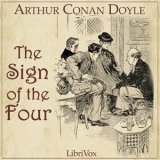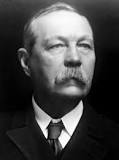The Sign of the Four Page #9
The Sign of the Four, also called The Sign of Four, is the second novel featuring Sherlock Holmes written by Sir Arthur Conan Doyle. Doyle wrote four novels and 56 short stories featuring the fictional detective.
At the mention of this gigantic sum we all stared at one another open-eyed. Miss Morstan, could we secure her rights, would change from a needy governess to the richest heiress in England. Surely it was the place of a loyal friend to rejoice at such news; yet I am ashamed to say that selfishness took me by the soul, and that my heart turned as heavy as lead within me. I stammered out some few halting words of congratulation, and then sat downcast, with my head drooped, deaf to the babble of our new acquaintance. He was clearly a confirmed hypochondriac, and I was dreamily conscious that he was pouring forth interminable trains of symptoms, and imploring information as to the composition and action of innumerable quack nostrums, some of which he bore about in a leather case in his pocket. I trust that he may not remember any of the answers which I gave him that night. Holmes declares that he overheard me caution him against the great danger of taking more than two drops of castor oil, while I recommended strychnine in large doses as a sedative. However that may be, I was certainly relieved when our cab pulled up with a jerk and the coachman sprang down to open the door. "This, Miss Morstan, is Pondicherry Lodge," said Mr. Thaddeus Sholto, as he handed her out. Chapter V The Tragedy of Pondicherry Lodge It was nearly eleven o'clock when we reached this final stage of our night's adventures. We had left the damp fog of the great city behind us, and the night was fairly fine. A warm wind blew from the westward, and heavy clouds moved slowly across the sky, with half a moon peeping occasionally through the rifts. It was clear enough to see for some distance, but Thaddeus Sholto took down one of the side-lamps from the carriage to give us a better light upon our way. Pondicherry Lodge stood in its own grounds, and was girt round with a very high stone wall topped with broken glass. A single narrow iron-clamped door formed the only means of entrance. On this our guide knocked with a peculiar postman-like rat-tat. "Who is there?" cried a gruff voice from within. "It is I, McMurdo. You surely know my knock by this time." There was a grumbling sound and a clanking and jarring of keys. The door swung heavily back, and a short, deep-chested man stood in the opening, with the yellow light of the lantern shining upon his protruded face and twinkling distrustful eyes. "That you, Mr. Thaddeus? But who are the others? I had no orders about them from the master." "No, McMurdo? You surprise me! I told my brother last night that I should bring some friends." "He ain't been out o' his room to-day, Mr. Thaddeus, and I have no orders. You know very well that I must stick to regulations. I can let you in, but your friends must just stop where they are." This was an unexpected obstacle. Thaddeus Sholto looked about him in a perplexed and helpless manner. "This is too bad of you, McMurdo!" he said. "If I guarantee them, that is enough for you. There is the young lady, too. She cannot wait on the public road at this hour." "Very sorry, Mr. Thaddeus," said the porter, inexorably. "Folk may be friends o' yours, and yet no friends o' the master's. He pays me well to do my duty, and my duty I'll do. I don't know none o' your friends." "Oh, yes you do, McMurdo," cried Sherlock Holmes, genially. "I don't think you can have forgotten me. Don't you remember the amateur who fought three rounds with you at Alison's rooms on the night of your benefit four years back?" "Not Mr. Sherlock Holmes!" roared the prize-fighter. "God's truth! how could I have mistook you? If instead o' standin' there so quiet you had just stepped up and given me that cross-hit of yours under the jaw, I'd ha' known you without a question. Ah, you're one that has wasted your gifts, you have! You might have aimed high, if you had joined the fancy." "You see, Watson, if all else fails me I have still one of the scientific professions open to me," said Holmes, laughing. "Our friend won't keep us out in the cold now, I am sure." "In you come, sir, in you come,--you and your friends," he answered. "Very sorry, Mr. Thaddeus, but orders are very strict. Had to be certain of your friends before I let them in." Inside, a gravel path wound through desolate grounds to a huge clump of a house, square and prosaic, all plunged in shadow save where a moonbeam struck one corner and glimmered in a garret window. The vast size of the building, with its gloom and its deathly silence, struck a chill to the heart. Even Thaddeus Sholto seemed ill at ease, and the lantern quivered and rattled in his hand. "I cannot understand it," he said. "There must be some mistake. I distinctly told Bartholomew that we should be here, and yet there is no light in his window. I do not know what to make of it." "Does he always guard the premises in this way?" asked Holmes. "Yes; he has followed my father's custom. He was the favorite son, you know, and I sometimes think that my father may have told him more than he ever told me. That is Bartholomew's window up there where the moonshine strikes. It is quite bright, but there is no light from within, I think." "None," said Holmes. "But I see the glint of a light in that little window beside the door." "Ah, that is the housekeeper's room. That is where old Mrs. Bernstone sits. She can tell us all about it. But perhaps you would not mind waiting here for a minute or two, for if we all go in together and she has no word of our coming she may be alarmed. But hush! what is that?" He held up the lantern, and his hand shook until the circles of light flickered and wavered all round us. Miss Morstan seized my wrist, and we all stood with thumping hearts, straining our ears. From the great black house there sounded through the silent night the saddest and most pitiful of sounds,--the shrill, broken whimpering of a frightened woman. "It is Mrs. Bernstone," said Sholto. "She is the only woman in the house. Wait here. I shall be back in a moment." He hurried for the door, and knocked in his peculiar way. We could see a tall old woman admit him, and sway with pleasure at the very sight of him. "Oh, Mr. Thaddeus, sir, I am so glad you have come! I am so glad you have come, Mr. Thaddeus, sir!" We heard her reiterated rejoicings until the door was closed and her voice died away into a muffled monotone. Our guide had left us the lantern. Holmes swung it slowly round, and peered keenly at the house, and at the great rubbish-heaps which cumbered the grounds. Miss Morstan and I stood together, and her hand was in mine. A wondrous subtle thing is love, for here were we two who had never seen each other before that day, between whom no word or even look of affection had ever passed, and yet now in an hour of trouble our hands instinctively sought for each other. I have marvelled at it since, but at the time it seemed the most natural thing that I should go out to her so, and, as she has often told me, there was in her also the instinct to turn to me for comfort and protection. So we stood hand in hand, like two children, and there was peace in our hearts for all the dark things that surrounded us.
Translation
Translate and read this book in other languages:
Select another language:
- - Select -
- 简体中文 (Chinese - Simplified)
- 繁體中文 (Chinese - Traditional)
- Español (Spanish)
- Esperanto (Esperanto)
- 日本語 (Japanese)
- Português (Portuguese)
- Deutsch (German)
- العربية (Arabic)
- Français (French)
- Русский (Russian)
- ಕನ್ನಡ (Kannada)
- 한국어 (Korean)
- עברית (Hebrew)
- Gaeilge (Irish)
- Українська (Ukrainian)
- اردو (Urdu)
- Magyar (Hungarian)
- मानक हिन्दी (Hindi)
- Indonesia (Indonesian)
- Italiano (Italian)
- தமிழ் (Tamil)
- Türkçe (Turkish)
- తెలుగు (Telugu)
- ภาษาไทย (Thai)
- Tiếng Việt (Vietnamese)
- Čeština (Czech)
- Polski (Polish)
- Bahasa Indonesia (Indonesian)
- Românește (Romanian)
- Nederlands (Dutch)
- Ελληνικά (Greek)
- Latinum (Latin)
- Svenska (Swedish)
- Dansk (Danish)
- Suomi (Finnish)
- فارسی (Persian)
- ייִדיש (Yiddish)
- հայերեն (Armenian)
- Norsk (Norwegian)
- English (English)
Citation
Use the citation below to add this book to your bibliography:
Style:MLAChicagoAPA
"The Sign of the Four Books." Literature.com. STANDS4 LLC, 2025. Web. 22 Jan. 2025. <https://www.literature.com/book/the_sign_of_the_four_100>.




Discuss this The Sign of the Four book with the community:
Report Comment
We're doing our best to make sure our content is useful, accurate and safe.
If by any chance you spot an inappropriate comment while navigating through our website please use this form to let us know, and we'll take care of it shortly.
Attachment
You need to be logged in to favorite.
Log In